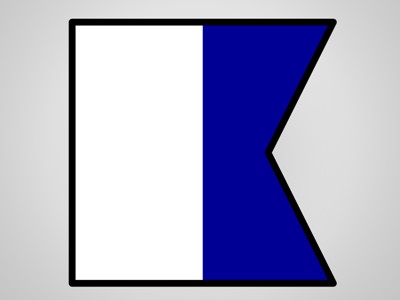It's tempting to want to just dive straight in, but taking a minute to prep and get ready will make sure you, and your diving buddies, get home safe with a good haul.
Safety first
Hoist your dive flag
If you’re diving, it’s not only a legal requirement that a diver’s flag is displayed, but it’s for your safety. If there are people in the water – whether they’re divers, spearers, snorkelers or open water swimmers – the blue and white "Alpha" flag pictured must be displayed on the vessel they're with. Free divers and spearfishers without a vessel don't legally have to, but many tow 'A' flags or the international red and white 'diver down' flag on floats.
Dive flags need to be at least 600mm x 600mm, and must be able to be easily identified from at least 200m away.
It’s also a good idea to have someone responsible on board your vessel who can look after divers while they’re underwater - find out more here.


Our top tips for safe diving
It’s easy to get a little rusty, so if you haven’t dived for a while get yourself on a refresher course. Re-familiarise yourself with your gear and check your techniques with an instructor.
Diving with a buddy is essential for safe diving. Not least for sharing the experience, you can do the pre-dive checks together and, if you get into difficulty, you can assist each other. If your mates aren’t into diving, become member of your local dive club.
Always undertake an annual service of your dive gear, including getting the regulator, BCD and cylinder valves checked out by a qualified technician. Don’t skimp on replacement parts if they’re even remotely needed.
It’s easy to get caught up in the adventure of the dive, but checking your supply and maintaining a reserve will help avoid an emergency.
Come up slowly and perform your safety checks to avoid decompression sickness (the bends) and barotrauma injuries. Making a safety stop is good practice and a good time to look up and check for approaching boats.
Planning for depth, duration and goals is vital to arriving back at the surface safe and sound. Once you’ve got a dive plan, it’s ideal to stick to it – with agreed bail-out or separation contingencies.
In an emergency
Remember the Diver Emergency Services number – it’s a 24/7 hotline for advice and treatment of all diving related incidents, including the emergency management of decompression illness.
0800 4 DES 111 (0800 4 337 111)
On VHF Radio, you can contact Coastguard on VHF Channel 16 or by cellphone on *500.
For other emergency services, phone 111.
Boatie's Best Mate.
Get a Coastguard membership today for peace of mind when you’re out boating.



